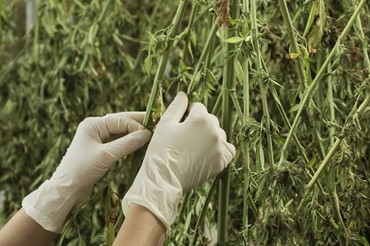It may sound simple enough – but it’s about ordinary, green grass. New Danish research and innovation have now cracked the code on how you can extract protein from grass in an effective way. The process is called biorefining, which covers a wide array of methods that can refine or improve the value of nature’s most basic resources. The perspectives are far-reaching.
The Danish farming industry produces millions of pigs every year – primarily for export – and the many pigs are being fed with soy protein, which is shipped to Denmark from South America and China.
Fresh grass can be used as feed for the two-stomached animals – cows, sheep, and goats – but it cannot be digested by pigs or chickens. At least not until now. The new method developed in Denmark has enabled the extraction of protein in a powder form from the grass. This can subsequently be mixed into the pig feed and give the pigs the protein they need.
The farming industry can hereby remove one of the large negative factors on its climate account by using protein-based grass instead of soy.
The first full-scale factory on its way
In the summer of 2020, BioRefine Denmark acquired the Danish dryer plant in Jutland, Nybrø Tørreri. The plant has experience with the production of pills for animal feed harvested from grass. Now, BioRefine Denmark is working intently to transform the previous dryer plant into Denmark’s first full-scale factory, which will use new technologies to produce plant protein from grass.
“We expect to begin protein production in May 2021, and we sense great interest from the farmers in the area, and in fact the entire country. We are aiming for commercial operation from day one, and we are therefore offering an attractive settlement for grass, which can compete with the crops we already know,” Vagn Hundebøll says, who is director in BioRefine Denmark and vice-concern director in DLG.
A gamechanger for the farming industry?
As the main consultant, NIRAS is currently working on designing and building the first factory in Denmark, which will produce grass protein. It is expected to be ready on May 1, 2021.
“What is really interesting is that the factory needs a capacity to process 50 tons of grass an hour 24/7 for the entire Summer during which farmers can deliver fresh grass. These are considerable amounts and I am certain that the perspectives of this development will become a gamechanger for the farming industry,” Erik C. Wormslev says, who is Director for development in NIRAS. He continues:
“We think that this can cause a domino effect where production plants like this one will be constructed in Denmark and where many farmers will go from producing e.g. grain to grass. It is easier to cultivate, causes less strain on the environment, and can now also be used as feed for the pigs.
Grass can also feed humans
From the very beginning of the project, the new factory has been designed with a special focus on food safety. This is because protein from grass in the long-run has a potential to be utilised for plant-based food for humans.
In addition for the primary purpose – utilising protein from grass – research is being done to explore the potential to refine the waste products of the process. This research focuses on utilising wastewater and fiber material from the production in order to use it in the production of e.g. biogas, isolation, etc.
Benefits of using grass as a protein source
- Grass is a perennial crop. This means that farmers do not have to plow and sow every year, which reduces CO2 emissions.
- Grass does not need as much fertilizer and plant protection products as other crops, which reduces the runoff of nitrogen to watercourses, fjords, and the ocean.
- Large amounts of CO2 can be saved by reducing the import of soy from South America and China.
Project parties
- DLG – international farming company, which among other things produces feed owned by Danish farmers
- Danish Agro – international farming company, which among other things produces feed owned by Danish farmers
- DLF – a global seed company dealing in forage and amenity seeds, owned by Danish farmers
- BioRefine Denmark – a new company owned by DLG, DLF, and Danish Agro
- The project to rebuild Nybro Tørreri is supported by GUDP. NIRAS is the main consultant on the project.




